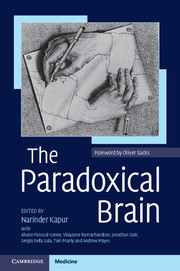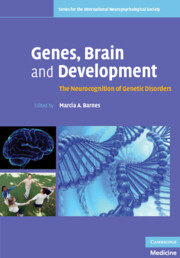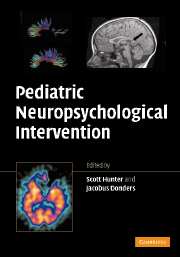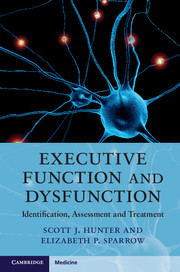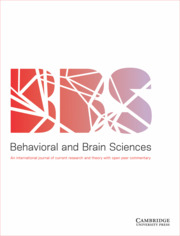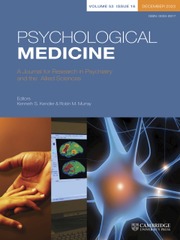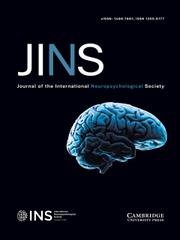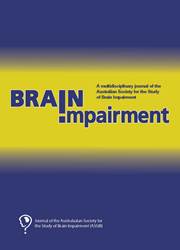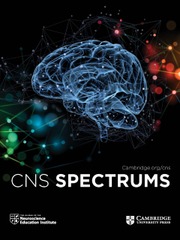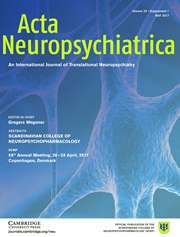The Paradoxical Brain
$108.00 ( ) USD
- Editor: Narinder Kapur, University College London
- Date Published: December 2011
- availability: This ISBN is for an eBook version which is distributed on our behalf by a third party.
- format: Adobe eBook Reader
- isbn: 9781139119047
Find out more about Cambridge eBooks
$
108.00 USD
( )
Adobe eBook Reader
Other available formats:
Looking for an examination copy?
If you are interested in the title for your course we can consider offering an examination copy. To register your interest please contact collegesales@cambridge.org providing details of the course you are teaching.
-
The Paradoxical Brain focuses on the phenomenon whereby damage to the brain can actually result in enhancement of function, questioning the traditional belief that lesions or other negative effects on the brain will result in loss of function. The book covers a wide range of topics by leading researchers, including: • Superior performance after brain lesions or sensory loss • Return to normal function after a second brain lesion in neurological conditions • Paradoxical phenomena associated with human development • Examples where having one disease appears to prevent the occurrence of another disease • Situations where drugs with adverse effects on brain functioning may have beneficial effects in certain situations A better understanding of these interactions will inform new rehabilitation approaches and the implementation of new therapeutic strategies. It will be of interest to those working at the interface of brain and behaviour, including neuropsychologists, neurologists, psychiatrists and neuroscientists.
Read more- Describes ways in which brain damage or sensory loss may result in better-than-normal performance
- Helps researchers develop models of brain function
- Helps clinicians to think of ways in which new forms of therapy may be designed and implemented
Awards
- Received an Honourable Mention at the American Medical Writers Association Medical Book Awards 2012
Reviews & endorsements
'Narinder Kapur has expanded the concept of paradoxical functional facilitation to cover many areas in neurology, neuroscience and neurorehabilitation, assembling a diverse and comprehensive group of world-class experts to explore the concept of paradox in many different disciplines. Their experience and ideas are of fundamental importance and deserve close attention from all who deal with disorders of brain function, so that we may focus on the uniqueness of the individual and their positive potentials, rather than thinking solely in terms of disorder.' Oliver Sacks, Columbia University Medical Center
See more reviews'… a refreshingly thoughtful, informative and provocative view of neuroscience that challenges the reader to consider and appreciate the brain in novel ways. It is a truly fascinating read.' Eleanor A. Maguire, University College London
'… a fascinating tour of the unexpected - the disorders, anomalies and paradoxes that are part of the human condition and that yield insights about the abnormal brain and normal brain function. The extraordinary range of examples and case studies assures that every reader will find material that is novel, informative and absorbing.' Larry R. Squire, University of California, San Diego
Customer reviews
Not yet reviewed
Be the first to review
Review was not posted due to profanity
×Product details
- Date Published: December 2011
- format: Adobe eBook Reader
- isbn: 9781139119047
- contains: 30 b/w illus. 68 colour illus. 30 tables
- availability: This ISBN is for an eBook version which is distributed on our behalf by a third party.
Table of Contents
Acknowledgements
Preface
Foreword Oliver Sacks
Author affiliations
Abbreviations
1. The paradoxical nature of nature Narinder Kapur, Alvaro Pascual-Leone, Tom Manly and Jonathan Cole
2. Paradoxical effects of sensory loss Alvaro Pascual-Leone, Souzana Obretenova and Lotfi B. Merabet
3. Paradoxical functional facilitation and recovery in neurological and psychiatric conditions Narinder Kapur
4. Paradoxes in neurorehabilitation Tom Manly, Ian H. Robertson and Narinder Kapur
5. The paradoxical self Vilayanur Ramachandran and William Hirstein
6. Paradoxical psychological functioning in early child development David J. Lewkowicz and Asif A. Ghazanfar
7. Cognitive ageing: a positive perspective Shira Zimerman, Lynn Hasher and David Goldstein
8. Paradoxes of learning and memory Henry L. Roediger, III and Andrew C. Butler
9. The paradox of human expertise: why experts get it wrong Itiel E. Dror
10. Paradoxes in Parkinson's disease and other movement disorders Ashwani Jha and Peter Brown
11. Paradoxical phenomena in epilepsy Steven C. Schachter
12. Paradoxical creativity and adjustment in neurological conditions Indre V. Viskontas and Bruce L. Miller
13. Paradoxical functional facilitation with noninvasive brain stimulation Umer Najib and Alvaro Pascual-Leone
14. Unexpected benefits of allergies and cigarette smoking: two examples of paradox in neuroepidemiology Judith Schwartzbaum, Linda Karavodin, Narinder Kapur and James L. Fisher
15. The paradox of autism: why does disability sometimes give rise to talent? Simon Baron-Cohen, Emma Ashwin, Chris Ashwin, Teresa Tavassoli and Bhismadev Chakrabarti
16. Paradoxes in creativity and psychiatric conditions Jonathan Hurlow and James H. MacCabe
17. The paradox of psychosurgery to treat mental disorders Perminder S. Sachdev
18. The paradox of electroconvulsive therapy Angela Merkl and Malek Bajbouj
19. Paradoxes of comparative cognition Howard C. Hughes
20. Paradoxical phenomena in brain plasticity Bryan Kolb and G. Campbell Teskey
21. Immature neurons in the adult brain. Breaking all the rules J. Martin Wojtowicz
22. The paradoxical hippocampus: when forgetting helps learning Howard Eichenbaum
23. Paradoxical effects of drugs on cognitive function: the neuropsychopharmacology of the dopamine and other neurotransmitter systems Roshan Cools, Esther Aarts and Mitul A. Mehta
24. The paradoxical brain - so what? Narinder Kapur, Tom Manly, Jonathan Cole and Alvaro Pascual-Leone
Index.
Sorry, this resource is locked
Please register or sign in to request access. If you are having problems accessing these resources please email lecturers@cambridge.org
Register Sign in» Proceed
You are now leaving the Cambridge University Press website. Your eBook purchase and download will be completed by our partner www.ebooks.com. Please see the permission section of the www.ebooks.com catalogue page for details of the print & copy limits on our eBooks.
Continue ×Are you sure you want to delete your account?
This cannot be undone.
Thank you for your feedback which will help us improve our service.
If you requested a response, we will make sure to get back to you shortly.
×
